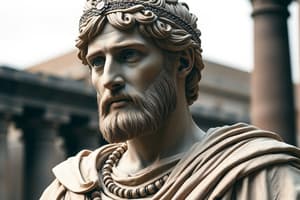Podcast
Questions and Answers
What is a metaphor?
What is a metaphor?
- An exaggeration to get a point across
- A story with a meaning beyond the literal meaning
- A comparison between two unlike things (correct)
- A reference to a known person
Which literary device uses exaggeration to convey a point?
Which literary device uses exaggeration to convey a point?
- Allusion
- Metaphor
- Hyperbole (correct)
- Allegory
In the dueling speeches in Julius Caesar, which rhetorical appeal does Brutus primarily use?
In the dueling speeches in Julius Caesar, which rhetorical appeal does Brutus primarily use?
- Pathos
- Kairos
- Logos (correct)
- Ethos
What is an allegory?
What is an allegory?
Which rhetorical device is exemplified by the repetition of the word 'honorable' in Mark Antony's speech?
Which rhetorical device is exemplified by the repetition of the word 'honorable' in Mark Antony's speech?
What figure of sound is typified by the repetition of the same consonant sounds?
What figure of sound is typified by the repetition of the same consonant sounds?
Which rhetorical device does Antony use to question Brutus' honor?
Which rhetorical device does Antony use to question Brutus' honor?
'A story that has meaning beyond the literal meaning' refers to:
'A story that has meaning beyond the literal meaning' refers to:
What is the main purpose of using figurative language in writing?
What is the main purpose of using figurative language in writing?
Which character in Julius Caesar is known for using the power of rhetoric effectively?
Which character in Julius Caesar is known for using the power of rhetoric effectively?
Why do the conspirators believe Caesar's weaknesses will consume his leadership?
Why do the conspirators believe Caesar's weaknesses will consume his leadership?
What moral dilemma does Brutus face in the play Julius Caesar?
What moral dilemma does Brutus face in the play Julius Caesar?
Which theme in Julius Caesar involves the conflict between one's public image and true self?
Which theme in Julius Caesar involves the conflict between one's public image and true self?
What role does fate play in Caesar's downfall?
What role does fate play in Caesar's downfall?
How does the play Julius Caesar explore the concept of tyranny and power?
How does the play Julius Caesar explore the concept of tyranny and power?
What is the primary reason Brutus gives for justifying Caesar's assassination in Julius Caesar?
What is the primary reason Brutus gives for justifying Caesar's assassination in Julius Caesar?
How does Shakespeare portray the theme of 'Public Image vs. Reality' in Julius Caesar?
How does Shakespeare portray the theme of 'Public Image vs. Reality' in Julius Caesar?
In Julius Caesar, why do Cassius and Brutus rely on the power of rhetoric?
In Julius Caesar, why do Cassius and Brutus rely on the power of rhetoric?
Which theme from Julius Caesar involves the central conflict between predestination and personal choice?
Which theme from Julius Caesar involves the central conflict between predestination and personal choice?
What is the significance of figurative language in literary works like Julius Caesar?
What is the significance of figurative language in literary works like Julius Caesar?
Why is the conflict between 'Public Image vs. Reality' crucial in understanding Julius Caesar?
Why is the conflict between 'Public Image vs. Reality' crucial in understanding Julius Caesar?
How does Shakespeare use the concept of 'Honor vs. Ambition' in exploring character motivations in Julius Caesar?
How does Shakespeare use the concept of 'Honor vs. Ambition' in exploring character motivations in Julius Caesar?
What distinguishes an allegory from a metaphor?
What distinguishes an allegory from a metaphor?
Which figure of speech uses exaggeration to convey a point?
Which figure of speech uses exaggeration to convey a point?
In the context of rhetoric, what role do logos and pathos play in persuasive speeches like those of Brutus and Mark Antony in Julius Caesar?
In the context of rhetoric, what role do logos and pathos play in persuasive speeches like those of Brutus and Mark Antony in Julius Caesar?
Which rhetorical device is demonstrated by the repetition of the word 'honorable' in Mark Antony's speech?
Which rhetorical device is demonstrated by the repetition of the word 'honorable' in Mark Antony's speech?
What is the main purpose of allusion in literature?
What is the main purpose of allusion in literature?
How does alliteration differ from other figures of speech like metaphors and hyperboles?
How does alliteration differ from other figures of speech like metaphors and hyperboles?
What distinguishes hyperbole from alliteration?
What distinguishes hyperbole from alliteration?
In the context of rhetorical devices, what distinguishes parallelism from repetition?
In the context of rhetorical devices, what distinguishes parallelism from repetition?
Flashcards
Metaphor
Metaphor
A comparison between two unlike things without using 'like' or 'as'.
Hyperbole
Hyperbole
Exaggeration used to make a point.
Allegory
Allegory
A story with a hidden meaning beyond the literal one.
Ethos
Ethos
Signup and view all the flashcards
Anaphora
Anaphora
Signup and view all the flashcards
Figurative Language
Figurative Language
Signup and view all the flashcards
Alliteration
Alliteration
Signup and view all the flashcards
Allusion
Allusion
Signup and view all the flashcards
Logos
Logos
Signup and view all the flashcards
Pathos
Pathos
Signup and view all the flashcards
Parallelism
Parallelism
Signup and view all the flashcards
What is Brutus's primary appeal in his speeches?
What is Brutus's primary appeal in his speeches?
Signup and view all the flashcards
What rhetorical device does Mark Antony frequently use?
What rhetorical device does Mark Antony frequently use?
Signup and view all the flashcards
How does Antony use anaphora to question Brutus's honor?
How does Antony use anaphora to question Brutus's honor?
Signup and view all the flashcards
What is the main purpose of figurative language?
What is the main purpose of figurative language?
Signup and view all the flashcards
What is Mark Antony known for?
What is Mark Antony known for?
Signup and view all the flashcards
What moral dilemma does Brutus face?
What moral dilemma does Brutus face?
Signup and view all the flashcards
What is the main motivation of the conspirators?
What is the main motivation of the conspirators?
Signup and view all the flashcards
Public Image vs. Reality
Public Image vs. Reality
Signup and view all the flashcards
Tyranny and Power
Tyranny and Power
Signup and view all the flashcards
Honor vs. Ambition
Honor vs. Ambition
Signup and view all the flashcards
Predestination vs. Personal Choice
Predestination vs. Personal Choice
Signup and view all the flashcards
How are logos and pathos used?
How are logos and pathos used?
Signup and view all the flashcards
What is the purpose of parallelism?
What is the purpose of parallelism?
Signup and view all the flashcards
Why are rhetorical devices important?
Why are rhetorical devices important?
Signup and view all the flashcards
Study Notes
Rhetorical Devices and Literary Terms
- A metaphor is a comparison between two unlike things without using "like" or "as".
- Hyperbole is a literary device that uses exaggeration to convey a point.
- An allegory is a story that has meaning beyond the literal meaning.
Julius Caesar
- Brutus primarily uses ethos (appeal to ethics) in his dueling speeches.
- Mark Antony's repetition of the word "honorable" exemplifies the rhetorical device of anaphora (repetition of a word or phrase at the beginning of successive clauses).
- Antony uses anaphora to question Brutus' honor.
- The main purpose of using figurative language in writing is to create vivid and evocative descriptions that engage the reader.
Characters and Motivations
- Mark Antony is known for using the power of rhetoric effectively.
- Brutus faces a moral dilemma in the play, as he struggles with the decision to assassinate Caesar.
- The conspirators believe Caesar's weaknesses will consume his leadership.
Themes
- The theme of "Public Image vs. Reality" involves the conflict between one's public image and true self.
- The theme of "Tyranny and Power" explores the dangers of unchecked power and ambition.
- The theme of "Honor vs. Ambition" explores the motivations of characters in the play.
- The theme of "Predestination vs. Personal Choice" involves the central conflict between fate and free will.
Figurative Language
- Figurative language is used to create vivid and evocative descriptions that engage the reader.
- Alliteration is a figure of speech that involves the repetition of initial consonant sounds.
- Hyperbole is a figure of speech that uses exaggeration to convey a point.
- Allusion is a literary device that references a person, place, event, or work of art outside the text itself.
Rhetorical Devices
- Logos (appeal to logic) and pathos (appeal to emotions) are both used in persuasive speeches to convince the audience.
- Anaphora is a rhetorical device that involves the repetition of a word or phrase at the beginning of successive clauses.
- Parallelism is a rhetorical device that involves the use of similar structures in two or more clauses or sentences.
Studying That Suits You
Use AI to generate personalized quizzes and flashcards to suit your learning preferences.




